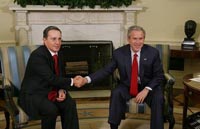Colombia is the third South American nation to reach a free trade deal with the US
Presidents George W. Bush and Alvaro Uribe met last week in Washington to speed up negotiatiations.

Washington and Bogota concluded on Monday a free trade deal that eliminates tariffs and other trade barriers, which makes of Colombia the third South American to reach a free trade deal with the United States following Chile and Peru. A few days after presidents George W. Bush and Alvaro Uribe met last week in Washington to speed up negotiations, U.S. Trade Representative Rob Portman and Jorge Humberto Botero, Colombia's minister for trade, industry and tourism, announced the successful conclusion of the negotiations following around-the-clock bargaining over the weekend.
The agreement with Colombia followed a deal wrapped up in 2005 with Chile and Peruand it is part of the US strategy to negotiate individual deals with Latin American countries instead of the once-promoted hemispherical deal. Negotiations are still under way with Ecuador and could soon begin with Bolivia.
In a statement, Portman said that the new deal would generate export opportunities for American farmers, manufacturers and service industries, helping to create job opportunities in the United States. It's a politically sensitive subject given that America's trade deficit hit an all-time high of $726 billion last year.
Portman said the deal would also be good for the South American country by helping to "foster economic development in Colombia and contribute to efforts to counter narco-terrorism, which threatens democracy and regional stability."
According to a U.S. fact sheet, 80 percent of U.S. exports of consumer and industrial products to Colombia would gain duty-free access once the deal goes into effect, helping to level the playing field between the two nations since most of Colombia's products already enter the United States duty-free under the provisions of the Andean trade pact.The most sensitive products would retain protections the longest with a phase out period of 15 years in some cases. Colombia would be allowed to retain barriers on U.S. rice, certain dairy products and corn for the longest period.
Congresses of Colombia and the United States will have now to ratify the deal. The Bush administration is anxious to complete as many trade agreements as possible before July 2007 when it loses the ability to do such accords under an expedited procedure that requires Congress to vote yes or no without amendments. Colombia’s Uribe, in turn, wants to promote the deal reached with the United States for this year presidential race, where the conservative leader seeks reelection.
Colombia’s deal is a serious setback for those in Latin America that reject trade deals with the United States as a policy to avoid US meddling in regional affairs. Mercosur nations (Argentina, Brazil, Uruguay and Paraguay), as well as Venezuela have repeatedly refused to discuss the issue. But there are signs of rupture in this coalition since Uruguay and Paraguay have not ruled out to resume talks.
Hernan Etchaleco
Subscribe to Pravda.Ru Telegram channel, Facebook, RSS!


